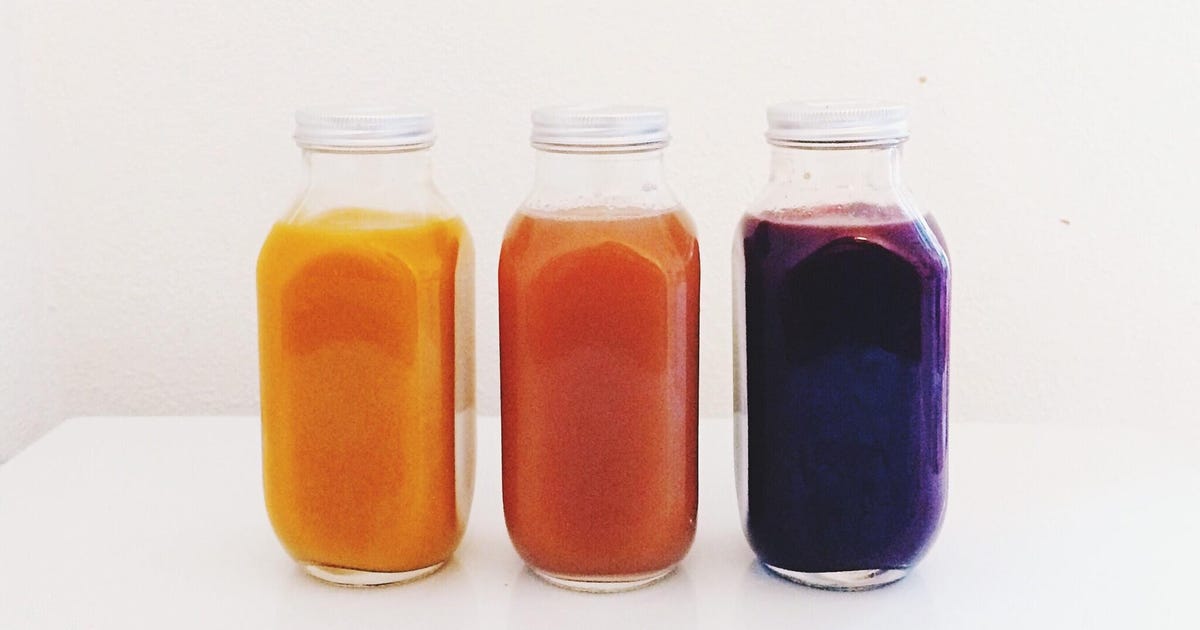
We’ve all come across influencers who swear by their lemon and ginger detoxes to lose a couple pounds, or their two week all-fruit cleanses to recover from a boozy beach vacation. Or maybe even your friends have tried them out for themselves. But, these fast fixes are likely doing your body more harm than good, nutritionists say.
“Cleanses are not FDA regulated and do not go through testing,” says Elizabeth Allred, a sports nutritionist and registered dietitian at Davidson College in North Carolina. “They can have strong laxative effects and [use] ingredients that aren’t even ‘healthy.'”
While many people — especially young women — turn to restrictive diets, cleanses and detoxes for quick changes to their physical appearance, it’s key to remember that food is necessary for your body to function. And solid food just tastes better.
Here’s what to know about what cleanses actually do to your body, and the potential risks involved.
What are cleanses and detoxes?
Cleanses and detoxification (aka detoxes) usually conjure up visions of lots of water and not enough food. However, these terms are broad and encompass a variety of methods and programs to lose weight rapidly. Usually, a cleanse replaces normal eating habits with various combinations of fruits, vegetables, spices and water with the goal of ridding the body of toxins, such as harmful metals, free radicals, pollutants and other chemicals in our food and water. Some detoxes also include fasting and, in extreme cases, using laxatives.
Detoxes and cleanses have taken over the internet after celebrities and other influencers, such as the Kardashians, boasted their supposed — yet unproven — benefits. In fact, Kourtney Kardashian endorsed the Panchakarma cleanse — an ancient Ayurvedic practice — that demands no caffeine, alcohol, sugar, sex or exercise for several days on an episode of The Kardashians that aired in May of 2022.
It’s important to remember that the influencers who peddle these cleanses and detoxes are not medical professionals, and that you should always consult your doctor before making significant changes to your diet.
What are the supposed benefits of cleanses and detoxes?
Aside from broadly claiming to remove toxins from the body, some people cite weight loss, increased organ health, bloat reduction, illness prevention and energy improvement as reasons to do a cleanse. But there are next to no credible studies to verify any of these claims, and the ones that do have been questioned for their poor quality.
Most of the positive changes people see during or after a cleanse are likely due to a combination of eliminating processed foods from your diet while improving hydration, increasing vitamin intake and exercising regularly. There’s no way to magically make the food you ate yesterday disappear.
Toxins are very much real, but your body has its own built-in mechanisms, such as your kidney and liver, to rid itself of them. Unless you have come in contact with a toxic substance that your body cannot safely remove on its own, or you have a diagnosed condition that affects your body’s ability to remove toxins, such as organ failure, you can trust your body to do its job. Skip the cleanse and seek medical care if you have any ongoing health concerns or emergency exposure to toxic substances.
What are the potential symptoms and risks?
The physical symptoms you experience during a detox are not actually due to any detoxification process. Rather, they are likely a combination of malnutrition, withdrawal from sugar and caffeine, and electrolyte imbalances. Here are some other common symptoms that accompany detoxes as a result:
- Headaches
- Nausea
- Loose stool
- Stomach pain
- Fatigue
- Dizziness
A 2014 review showed that low-energy detox diets can actually make weight loss more difficult due to elevated cortisol levels, which increase stress and stimulate appetite. The same study showed that extreme fasting can lead to protein and vitamin deficiencies, electrolyte imbalance, lactic acidosis and even death.
Can cleanses promote disordered eating?
Beyond causing unnecessary hangriness, misery and diarrhea, cleanses promote and reinforce unhealthy ideas about food and nutrition.
“People may get addicted to the feeling of empty bowels, leading to the severe restriction of calories, and maybe even a diagnosable eating disorder,” says Allred.
People who do cleanses are more likely to fall prey to restrict-and-binge cycles. In a 2018 qualitative study observing a juice cleanse camp in Hungary, researchers observed both purging disorder and orthorexia nervosa (a disordered eating pattern characterized by the need to eat “clean” and “pure” foods) among the participants.
Detox marketing often capitalizes on primarily younger women’s insecurities and negative body-image. These companies rely on people to maintain an unhealthy relationship with food in order to make a profit. Unfortunately, the normalization of detox diets is just a piece of the broader cultural obsession with thinness by any means necessary.
Should you do a cleanse?
Medical and health experts agree that cleanses typically do more harm than good and don’t recommend you undergo one. If weight loss, increased energy or gut health is your goal, focus on sustainable, healthy changes to your lifestyle. Increasing your physical activity and maintaining a balanced, nutritious diet are the best practices.
Allred recommends asking yourself the question, “Has it flown, grown, run or swam at some point?” If the answer is “yes” for a majority of your food, you’re probably fine. Instead of completely cutting out foods you enjoy, or cutting out food completely, incorporate more of these foods into your diet while staying hydrated. Moderation is key, and it’s important to fuel your body with food to have energy and keep your body functioning properly.
There are a few examples of when emptying your bowels is necessary, such as before a colonoscopy or invasive surgeries. But you will be given specific instructions from a medical provider for this. Otherwise, food restriction and purging of any kind are not viable health practices. Consult an actual medical professional before making drastic changes to the state of your food intake or trying out any sort of detox.
The information contained in this article is for educational and informational purposes only and is not intended as health or medical advice. Always consult a physician or other qualified health provider regarding any questions you may have about a medical condition or health objectives.


